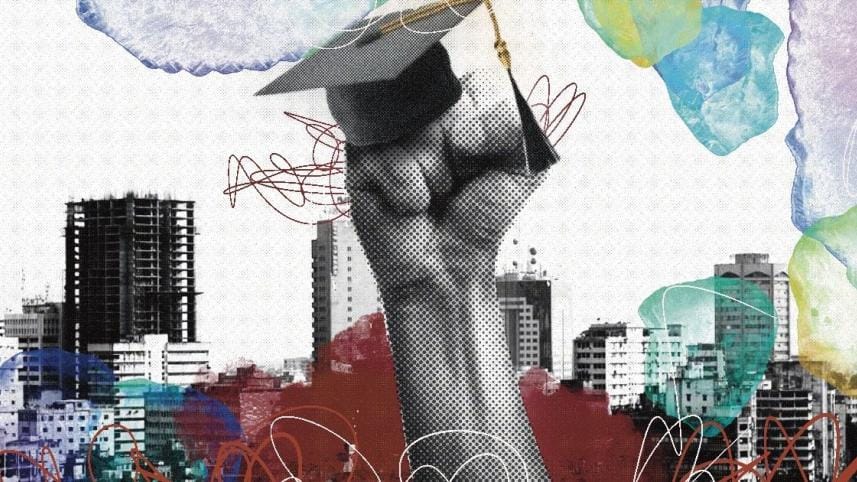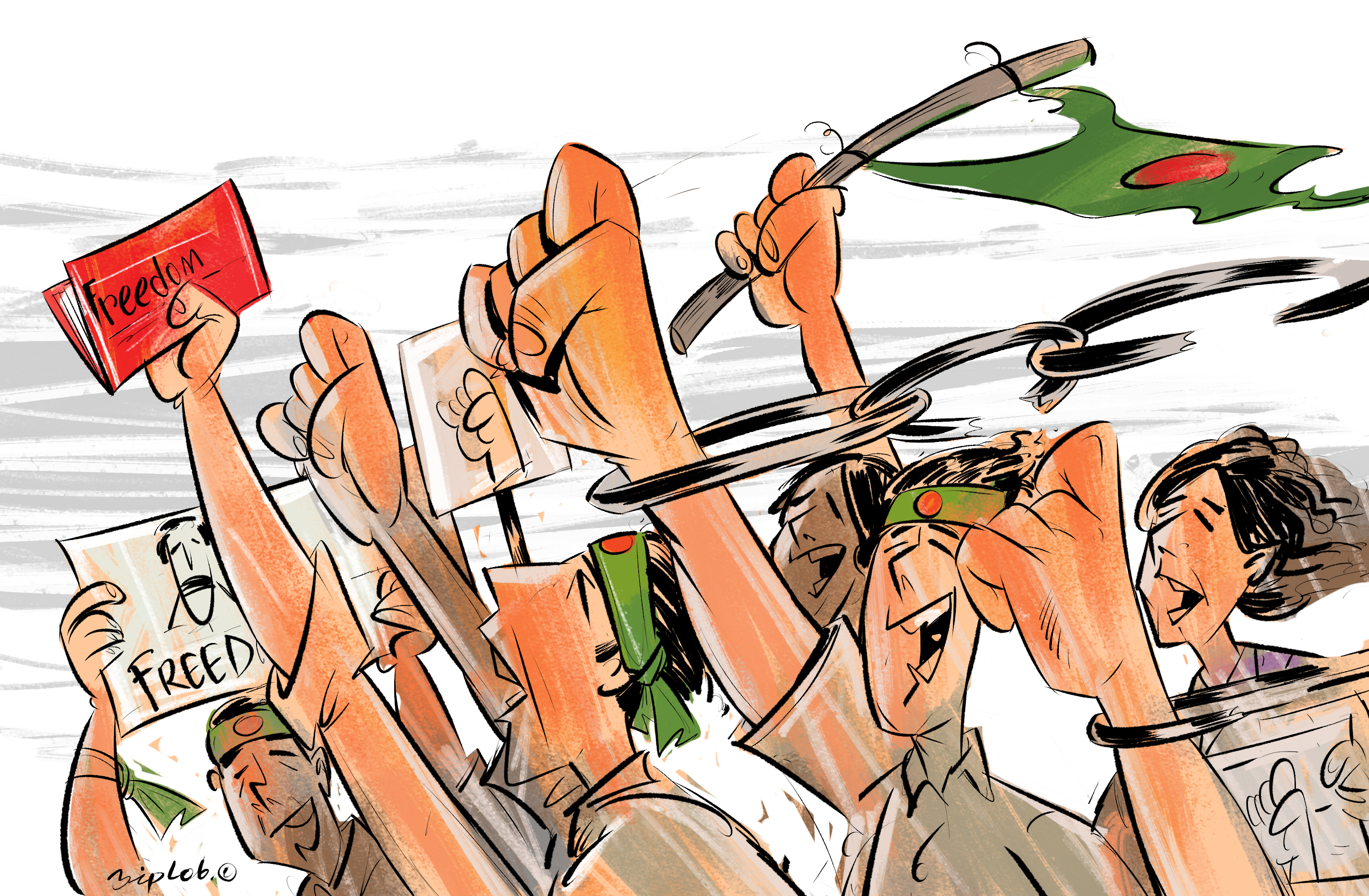Revolution and education: Some thoughts on the ‘political’ in universities

Much has changed since the all-out protests began in mid-July, galvanising an entire nation, from aggrieved mothers to despondent rickshaw pullers, to bring down a 15-year-old authoritarian regime. It was indeed people's power and it was infectious. The movement mobilised not only street agitation and online activism—forms of protest we are already familiar with—but also an unprecedented array of civic actions. While in the fervour of the moment when old binaries of young and old, right and left, and secularists and religionists converged, it seems urgent to consider how these convergences may play out in the transformation that is being called for.
At this moment, all eyes are on the interim government. The need to restore law and order, stabilise and grow the economy, and institute a robust political system and culture that do not fail again makes the tasks complex and onerous for the new government. How will the country recoup, regroup and rebuild? Eventually, when the country emerges from the transitory interim phase to a democratically elected one, will all that the revolution called for in spirit prevail in structures? How will inclusion be defined and what kinds of processes will ensure it? Experts will need to work out how the current phase and its policies are emboldened to achieve this desirable end.
Many are already talking about constitutional changes and mechanisms such as truth and reconciliation that might provide a means to political rectification. We may also look at the Arab Spring which sociology professor Asef Bayat refers to as "refolution"—a term referring to a phenomenon which resulted in neither revolution, nor reform—to draw lessons from and work towards the required redistributive justice to make the transformation meaningful. While experts work on the state apparatus, economy and political mechanisms, society also has a role to play. As a part of civil society, universities may play their part in this transition as universities are the very sites where it all began.
Universities have long provided fertile grounds for student protests that have also taken on autocratic regimes in the past. However, public universities carry deep political fractures polarising both student and faculty bodies. They are now confronted with reform within and between students, faculty, and overall institutional governance. Private universities have been relatively free of deep political factionalism, partly by design. In recent years, they have resisted pressures to introduce student politics with the stated intent that students remain focused on academics. While this confirmed for many that private university students are placidly apolitical, their involvement in recent events proved otherwise. In fact, their participation in the July movement—propelled by their participation in earlier movements such as the 2015 No Vat on Education protests and the 2018 road safety movement—allow us to reconsider whether the old binaries of public and private hold anymore.
Private universities are now much more diverse in class composition than they were a decade ago. The trickle-down effect of the neoliberal economy has enabled a broader class to invest in better education. Additionally, there is a generational shift towards prioritising higher spending on education. This diversity in class composition is equally reflected in differing opinions and stances on a variety of issues ranging from gender, religion, history and national identity. The fact that distinct groups have not yet coalesced around these important issues has been a boon for the movement. The coming together to depose an autocratic regime could, therefore, not be prevented by the strength of or competition between distinct groups.
Such a position that is driven neither by discrete ideology nor through any particular party patronage has lived up to its potential of galvanising a nationwide movement. It is now imperative to wrestle with the challenges posed by the need to enunciate the new "political" in the nation and elsewhere. An important part of this wrestling lies in the recognition of the social capital formed through the coming together of students. Universities that thrived on factional student politics need to ensure that the capital and collective energy do not fall into old structures and patterns of behaviour.
Whether public universities will ban politics altogether and how this will affect any possibility of its return later require careful thought and execution. Private universities, where national politics through student groups was not allowed, may strengthen some of the ways in which they have already been nurturing students' growth and promoting student-centricity. Students rising to the call of post-revolution clean-up and maintenance demonstrate civic engagement that universities who actively promote it can further harness. Embedding civic engagement into the curriculum and establishing university-wide networks that bring students together for the common good would be an excellent way to protect some of the social capital accrued from this movement.
As students engage societal problems and work collectively to address them, they learn by doing and preparing for collaborative action in many spheres of life, including engaging higher authorities with reason and purpose. It is this form of engagement that paves the way for societal changes. Universities that have responded appropriately to students' justified demands and universities that have formal or informal mechanisms of standing by students' rights to protest, are well-placed to deepen their channels of student engagement in order to cultivate their collective and creative energy.
Last but not least, the classroom is of essence. Paolo Freire in Pedagogies of the Oppressed spoke of education as the seed for societal change, highlighting pedagogies in classrooms as the place to start. Freire argues that education must be redone to move away from a banking mode, where wisdom is deposited from teacher to student, to one where learning is born out of students being allowed to think outside the box. In this framework, the classroom is a place where "wisdom" is co-created and both teacher and student learn and teach each other new things. Enlivening a classroom with present-day realities, engaging students to think about them collectively, and allowing them the space to express their aspirations while guiding them through the ethical import of their thinking are how we retain the relevance of Freire today. As educators, we firmly believe that when such approaches to education are pursued, they provide the basis for healthy, inclusive societal change, and many students in this movement are surely richer for having received such an education.
As the country emerges from the revolution to rebuild, universities must deepen some of the good work they have done and rethink what has not worked. We have seen that students are capable of teaching themselves many things, including bringing down a regime. They must constantly remember what brought them together across many divides, including the public-private one, in order to arrive at the kernel and essence of this new politics. As the dust settles, universities must come forward with students to enunciate the new political and effective pathways to achieve its objectives. Students need university classrooms as much as classrooms need the students. We must embrace this relationship and do it through mutual respect so that our students remain the life force of the nation. It is urgent that we, as teachers and students, get back to our calling in education as co-learners towards the continued and arduous task of nation-building.
Dr Samia Huq is professor of anthropology and dean of the School of General Education in BRAC University.
Shafiul Aziz is lecturer at the School of General Education in BRAC University.
Views expressed in this article are the author's own.
Follow The Daily Star Opinion on Facebook for the latest opinions, commentaries and analyses by experts and professionals. To contribute your article or letter to The Daily Star Opinion, see our guidelines for submission.



 For all latest news, follow The Daily Star's Google News channel.
For all latest news, follow The Daily Star's Google News channel. 


Comments